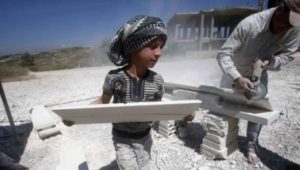Refugee children forced to work in Lebanon
As many as 200,000 Syrian refugee children in Lebanon have been forced into child labor, according to the United Nations.
Many of these children have lost one or both parents as well as their homes during their county’s bloody civil war.
Most have fled to Lebanon looking for safety but only to find it comes at the price of their innocence and childhood.
Ahmed Assassi, a worker with NGO Save the Children, says many of these young people have been forced to give up on their education and their childhoods – even though child labour is technically illegal in Lebanon.
“So many of them are not living their lives as children – as they should be – because for them, life is now just about getting money and putting food on the table,” he said.
 “We worry that we will lose a whole generation here – their minds, their talents and the contributions they could one day make,” Mr Assassi said.
“We worry that we will lose a whole generation here – their minds, their talents and the contributions they could one day make,” Mr Assassi said.
Some Syrian refugees as young as 5 years old are working long hours and often in dangerous conditions — using machinery in factories or working with toxic substances, Mr Assisi says.
He says some are abused by employers or are working in sweltering conditionions on farms.
“They’re missing out on the chance for an education, and the hard nature of their work gives them little chance to recover from the trauma – the emotional stress – they have suffered because of the conflict,” Mr Assassi said.
With Syrian refugees continuing to enter Lebanon as the civil war moves into even bloodier stages, more children are expected to join this lost generation.
Child labour has long been a feature of life in the Middle East and has always been a problem in Lebanon because of its poor economic state and decades of ineffective government.
But the Syrian crisis — one of the world’s most horrific humanitarian catastrophes — has caused it to reach alarming new levels.
About 1.5 million Syrians, equivalent to a quarter of the Lebanese population, have taken refuge in Lebanon since the crisis began in 2011, according to the Lebanese government.
That’s in addition to the nearly 300,000 Palestinian and Iraqi refugees Lebanon is already hosting.
To protect its own citizens’ jobs, the Lebanese government has restricted Syrians to working only in agriculture, construction, and cleaning — all low-paying, insecure and temporary jobs.
For well-educated and qualified Syrians, such as doctors, engineers and IT professionals, it’s almost impossible to get a work visa.
As a result 71 percent of the 1.1 million Syrians registered with the United Nations in Lebanon live below the poverty line.
Life in Lebanon is expensive. Unlike Turkey, Iraq, and Jordan, Lebanon doesn’t have designated Syrian refugee camps.
Syrians can live in one of the country’s 12 Palestinian refugee camps — but they have to pay an average rent of $US200 a month, a fortune for many people.
And even aid from the UN is becoming scarcer and the organisation faces the prospect of cutting critical food and relief programs.
The United Nations High Commissioner for Refugees, or UNHCR, sent out a warning to donors last month, saying it needs $116 million to help Syrians in Lebanon.
Otherwise, by this winter, 174,000 households won’t get money for heat, 65,000 families won’t receive lifesaving health care, and 30,000 families will be cut off from monthly cash.
“We are quickly running out of resources,” a UNHCR spokesperson said.
“And when families face destitute economic conditions, they’re more prone to resorting to things like sending off their kids to work,” he said.
Laurie Nowell
AMES Australia Senior Journalist












